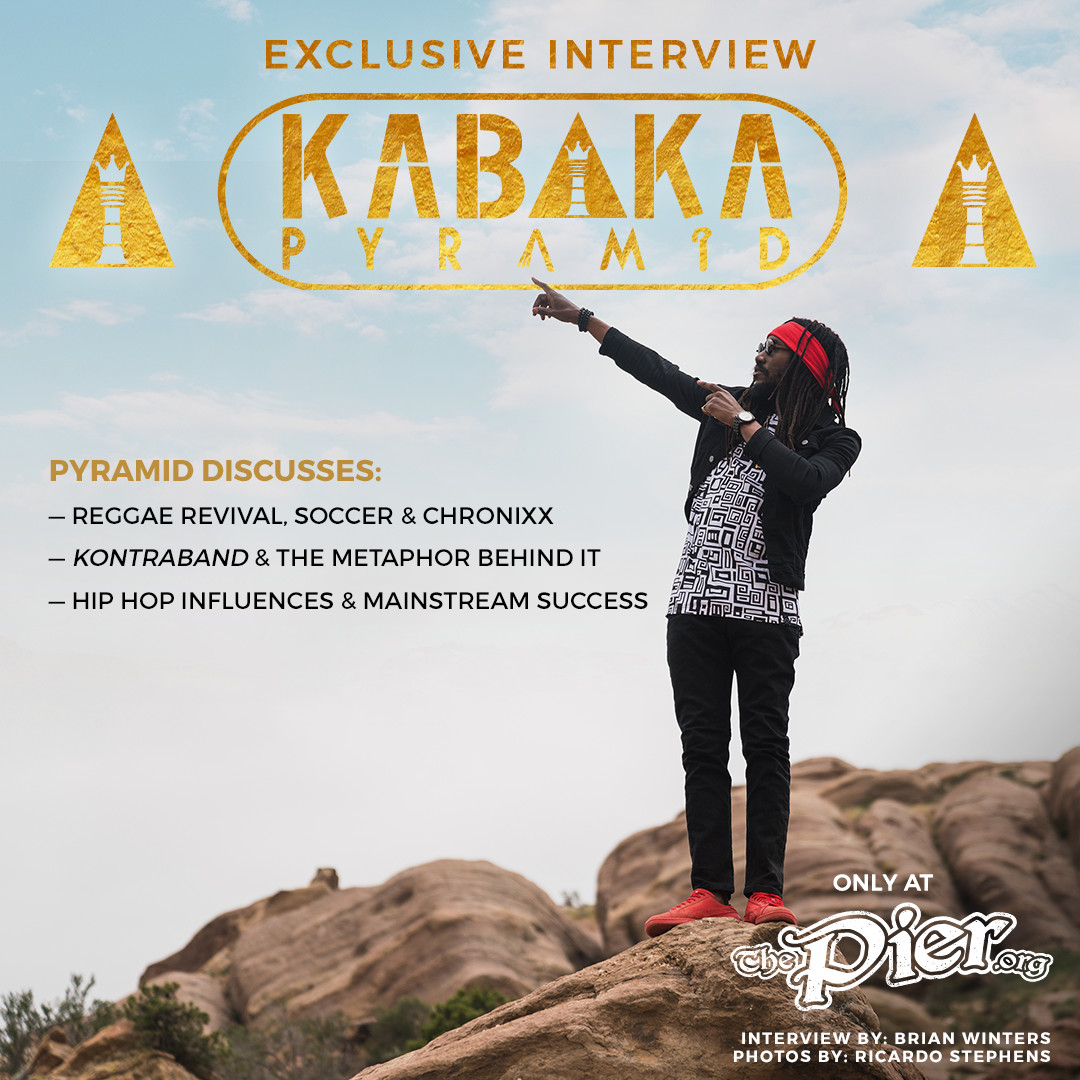
In late May 2018, Kabaka Pyramid dropped his triumphant debut album Kontraband, a joint release via Ghetto Youths International and Bebble Rock Records. Born Keron Salmon, Kabaka Pyramid established himself as an emergent Jamaican star following his 2013 Lead The Way EP, and his numerous memorable guest features. Few vocalists in any corner of music possess the calculated lyricism and prolific songwriting ability that have come to define Kabaka Pyramid.
We recently got hold of Kabaka to break down his extremely resonant debut, Kontraband. Kabaka Pyramid also discusses various other topics, including his hip-hop influences, where he sees the path of success for Jamaican artists going forward, and who is the better soccer player: himself or Chronixx.
Kabaka offers a unique perspective on the music industry, the metaphor behind Kontraband, and reflects on whether or not the content of his music is at odds with an opportunity for mainstream success. You’d be hard pressed to find an artist with the humility and genuineness that Kabaka naturally exudes. Enjoy our thought-provoking conversation with The Pyramid below.
Interview: Kabaka Pyramid
The Pier: Kontraband, which is your full-length debut, contains 16 tracks and 7 guest features. Did you feel like you needed to do something extra because it was your debut?
KP: I mean, yeah, in a sense. I definitely wanted a good body of work for the debut. I wanted to keep it, initially, to like 14 tracks. But trust me, it was quite a process even reducing the amount of tracks. We had maybe 30 tracks in all choosing from. So, it was just the songs that really grew on us the most. So, when it all boiled down we ended up with 16.
The Pier: Getting into the content of the music on Kontraband, you really touch on a ton of different social and political issues affecting people around the world. Whether it’s the ongoing refugee crisis, police brutality and racial profiling, politics, corruption, all those things and more. Where do you turn to in order to educate yourself on this broad spectrum of issues?
KP: Well, a lot of it is just right in your face. With social media now, a lot of the issues in the world come to the fore faster. So, you get to see, once you open your mind and you’re actually following accounts that really have substance, and are really dealing with issues, then you get the news. It comes to you.

But other than that, I’m someone who reads a lot, so I try to educate myself about things. Some of it comes from reading books, articles, websites, or authors that I really get interested in.
The Pier: I’m curious if you think that because of the messages in your music and the consciousness of it, do you think that has in anyway prevented you from having more mainstream, commercial success?
KP: Well, yeah definitely. I think that’s the whole theme behind Kontraband. Basically, that the positive messages, the conscious messages, and the thought-provoking lyrics is like contraband in this time. The system and the powers that be don’t really want the people to have that, and to be on their mind. So, the whole metaphor for this kind of music is like we are smuggling in this kind of music. We have to push it through our own means through the underground, because mainstream not really promoting things like that. I feel in time, the world is becoming more and more awake and aware. I feel there will be a chance in the future for more thought-provoking music to make in the mainstream.
The Pier: Do you think that mainstream success could be via the hip-hop channels, the HOT 97s and Power 105s of the world? Or do you think it’s a matter of carving your own route and building up reggae rather than piggybacking off of hip hop?
KP: You see that’s the thing. Ideally, I’ve always wanted that kind of appreciation from the hip-hop community in the US and things like that, because obviously that’s one of my major influences. But even when you check it now, a lot of those airwaves are being dominated by trap music. Which is not necessarily the type of hip-hop I draw from. So, even a lot of the artists I listen to, they’re probably not getting their music played on HOT 97 or Power 105 and all of these things. You know, Mos Def, Talib Kweli, all of dem kinda man, you know?
But I think with the right collabs, and the right producers, anything can happen. I think there’s mainstream production, which is different than mainstream lyricism and choice of topics. And once you have the right production and right type of beat, certain kind of song, I think radio will be more receptive to it. Even though you can still talk about issues that matter.
The Pier: It’s cool that you bring up Talib Kweli because I was watching your “Can’t Breathe” video with Dub FX, and when you break into the rap verse, I definitely heard some Talib type of flow in there.
KP: Yeah haha, I was probably listening to him a lot at that time. That was verse I wrote way back in like 2006. So, definitely a major influence for sure. I borrow a lot of his styles and skills, and rhyme schemes, you know.

The Pier: On Kontraband you collaborated with mostly Jamaican artists. I know you had Stonebwoy from Ghana and Akon featured as well, but would you be interested in working with some other American artists, whether from hip hop, R&B, or other genres?
KP: Yeah, definitely. I got the opportunity to do a song with Raekwon through Walshy Fire with the Accurate Mixtape. So, that was a major thing for me being a big Wu-Tang fan growing up. Definitely open to doing more stuff like that for sure.
The Pier: So, we hear this term “reggae revival” associated with you and Protoje, Chronixx, Jesse Royal, and others. I know you’re friends with these guys and work with them a ton, but do you get tired of this term or feel like it’s not an accurate description of your music?
KP: I mean, what gets tiring to me is the debate about the actual term. You know, like I find it a bit annoying that there’s so much debate about the term and what revival actually means. I think a lot of it coming from some people’s reluctance to highlight a set of youths within a circle that may be… in terms of people within the industry having a problem with it, maybe they don’t feel a part of it, and things like that. Maybe a likkle resentment. And I can understand that. I’ve never subscribed to the whole idea that the reggae revival is like this team or this roster of artists. And that you’re either inside it or you’re outside it. I think it’s a whole movement that’s happening.
There’s a revival within a lot of different types of music. Even hip hop. There’s a lot of upcoming, conscious hip hop artists. Young artists who changing things. I think what they would call the revival is our version of that. Our microscope and that new wave of consciousness. It’s definitely not something that I feel is a specific list of artists. So, I have a likkle problem with that type of approach. Just debating over the term revival is definitely tiring to me.
The Pier: You have the one song “Reggae Music” on the new album with the line, “If you’re born overseas, you need fi take a trip, like a pilgrimage to Mecca, cuz’ a we created it.” Is this harping on the idea that Jamaican music is not getting the respect it deserves while people continuously borrow from it?
KP: Definitely. Definitely. I think a lot of that is happening right now. Even within pop music, you know. A lot of US music that’s influenced by dancehall and reggae culture. I don’t think the respect is being paid, and I don’t think the homage is being paid to where the influence is coming from. It’s just kind of like another inspiration or another vibe that they’re bringing to music, but they’re not really showing where it’s coming from. So, I think that the artists, the producers that are incorporating this dancehall vibe, this reggae vibe, can do more to highlight the culture of Jamaica, where it’s coming from. And give us a platform internationally, so that ones from Jamaica can be given those opportunities to shine at that level.
The Pier: Anyone who follows you on social media knows you are a huge sports fan. We often see you repping the Barcelona jersey, and you’ve talked about the joy soccer brings to you. Now, we’ve also seen some clips of Chronixx playing soccer. Who is the better soccer player?
KP: Haha! I mean, I would definitely say me still haha. But it’s two different type of players. I’m more of a sender, I like to distribute the ball and Chronixx like fi run at defenders and attack and things like that, you know.

The Pier: Haha, we’d love to see that match up… You also dropped some lyrics referencing past and present NBA players like DeMar DeRozan and Dennis Rodman. Are you a big fan of basketball as well?
KP: Yeah for sure. I grew up a basketball fan. My father introduced me to basketball. I used to watch games with him in the likkle TV room and things like that. From way back I was a Knicks fan, I was a Sonics fan. Sean Kemp. Lakers with Kobe and Shaq. Definitely a big Kevin Durant fan right now.
The Pier: Just to wrap up our conversation, can you share any future projects or tours coming up?
KP: Yeah, definitely touring Kontraband still. We have a US tour coming up. We’ll be on the Welcome to Jamrock Cruise in December. Looking to go to Ghana for a show with Stonebwoy in December as well. We’ll definitely still be touring the album.
We’re still singling some songs off the album. So, “Reggae Music” is next, and we’ll be looking to do maybe two or three other videos from the album, taking us into next year.
But I have some collabs too. I have a collab with Iyaz, who did the big Billboard song “Replay” a couple years ago. And I have a collab with UB40. I have one with Rudimental out of England that’s coming out in January. I have one with Chase & Status that they’re looking to drop in the jungle scene soon. So, a couple things brewing for sure.
The Pier: Well, Kabaka, thanks so much for taking some time to chat. We’re all really digging the new album Kontraband. Wishing you continued success.
KP: Give thanks! Give thanks for the support.
Watch: Kabaka Pyramid – “Kontraband” (ft. Damian Marley)
Related Links:
Kabaka Pyramid Website
Kabaka Pyramid Facebook
Interview By: Brian Winters
Photos By: Ricardo Stephens
Watch: Kabaka Pyramid – “Can’t Breathe”

